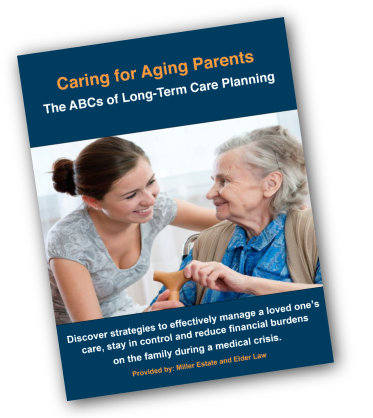Long-Term Care Planning
Caring for aging loved ones is a challenge. Our free guide will help ensure you have the right legal tools in place to be able to provide the highest level of care.
 Download the e-Book for FREE Today!
Download the e-Book for FREE Today!
Learn how to protect your assets from the cost of long-term nursing care.
Most people work hard their entire lives to accumulate a nest egg. That nest egg usually includes retirement accounts, savings accounts, investments, CD’s, and their home. Many people have an investment advisor whom they trust to advise them on ways to grow their nest egg money so that they have as much as possible to live on during retirement and—hopefully—leave an inheritance to their children and grandchildren.
While most people are concerned about drops or dips in the stock market, most are completely blind to the biggest risk to their nest egg: the cost of long-term care.
Without question, long term care costs are the biggest threat to your life savings.
If one or both spouses have to go to an assisted living facility or a nursing home, an entire lifetime of savings can be wiped out.
For whatever reason, people simply do not plan for this potentially catastrophic expense.
A 5-year stay in a nursing home costs $387,500 today.
According to Genworth—a company that has been in the long-term care industry for many years—the average cost of an assisted living facility in 2018 was $3,566 per month, or $43,000 per year. The average cost of a nursing home is $6,459 per month, or $77,500 per year. In 2038, the projected monthly cost of an assisted living facility is $6,451 per month, or $77,400 per year, and the projected cost of a nursing home is $11,648 per month, or $139,776 per year!
That means a 5-year stay in a nursing home in 2038 could cost you $698,880. Where would you and your family get the money to pay for that care?
There are only 3 ways to pay for long term care:
You pay out of pocket
Long-term care insurance
The government pays through the Medicaid (not Medicare) program
Medicare does not pay for long term care. Medicaid will pay, but it is very difficult to qualify for Medicaid. Medicaid is a means-tested program, meaning that you can only qualify if you have minimal income and assets. Those income and asset limits are very low. For example, an individual cannot have more than $2,000 in countable assets in his or her name to qualify for Medicaid. A married person whose spouse is going to the nursing home can keep one half of the couple’s assets (no matter who owns them), up to a maximum of $130,000 as of 2021.
Long-term care insurance is the best way to pay for long-term care.
There are different types of long-term care policies available. Unfortunately, most people do not have long-term care insurance, and they wait too long to get it. Without long-term care insurance and an inability to qualify for Medicaid, the vast majority of people have to spend their life savings if they need long-term care.
By putting a plan in place ahead of time, you can prepare for these expenses and learn how long your money will last.
Our Family Asset Protection Planning (FAPP) service is designed to help you understand exactly what Medicare pays, how to qualify for Medicaid, and what resources are out there in the event you need care in the future. It also includes a road map tailored to your situation that will answer many of your questions about resources that are available, and advice on avoiding the mistakes that prevent so many people from qualifying for Medicaid. It will also show you how long your assets will last if you or your spouse has to have in-home care, assisted living care, and/or nursing home care. Additionally, our FAPP service will show you what your options are for paying for long-term care. Finally, the plan will give you options for protecting some of your life savings so that everything you have worked for is not at risk.
Without some type of Family Asset Protection Plan in place, your entire life savings and—potentially—your marital home are at risk to long-term care expenses.
With the right plan in place, you will gain peace of mind knowing that you have enough money to pay for your long-term care expenses should you need them, and not become a burden on your children in the event you don’t have the money to pay for your care. Our FAPP service will get you a road map to help you navigate the long-term care maze.
We have helped many families just like yours with this type of planning.
The good news is that, once you have the plan in place, then you have the peace of mind knowing that you can pay for care. This planning also provides you with access to our team of estate planning attorneys to help guide you through the long-term care maze as your circumstances change.
You don’t have to go broke paying for long-term care.
Contact attorney Bill Miller at Miller Estate and Elder Law and learn how we can help you understand your options, make informed decisions about how you plan to pay for long-term care, and get you a road map to help you navigate the long-term care planning maze.